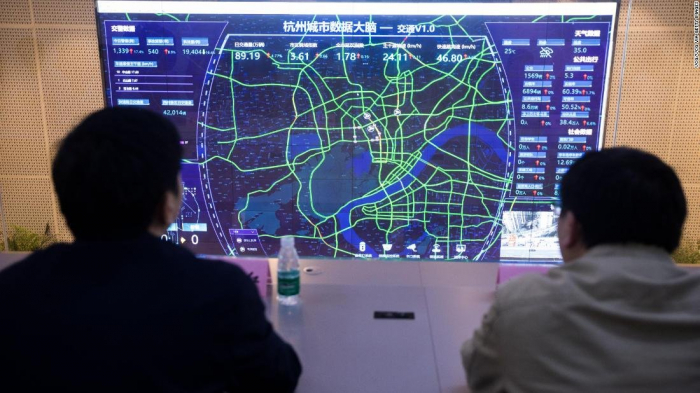Traffic used to be a frequent headache for residents in Hangzhou, the eastern Chinese city that's home to Alibaba.
The metropolis of 7 million people once ranked fifth among China's most congested cities, but it has now dropped to 57th on the list.
Alibaba (BABA) says that's because of one of its inventions, dubbed the City Brain, which uses artificial intelligence to gather information across Hangzhou, such as video from intersection cameras and GPS data on the locations of cars and buses.
The platform analyzes the information in real time as it coordinates more than 1,000 road signals around the city with the aim of preventing or easing gridlock.
After two years of testing, the system appears to be working. Alibaba says the City Brain has shortened commutes and also helped first responders by enabling fire trucks and ambulances to halve the amount of time it takes to get to the scene of emergencies.
Some regular drivers confirm things have improved. Ye Bojie, who works for top ride-hailing firm Didi Chuxing, said it once took him 40 minutes to drive 3 kilometers (1.8 miles), but the conditions are "much better now."
"The cities in China probably are facing more challenges than any other city," said Wang Jian, chairman of Alibaba's technology steering committee.
But with emerging technologies like machine learning, communities are getting the tools to solve problems such as water shortages, he told CNN.
"Eventually, everything is going to depend on the computing power, just like we depend on electricity," Wang said.
Other cities and companies are betting that tech advances can address some of urban life's difficulties. Alibaba's platform is being used in a handful of other Chinese cities and was introduced last year in Kuala Lumpur, the capital of Malaysia.
Last fall, Volkswagen (VLKAF) and Siemens (SIEGY) began trials of a smart traffic system in the German city of Wolfsburg, which was aimed at helping drivers predict when to expect a wave of green lights.
Experts say this is just the start.
"Even the most cutting-edge smart cities on the planet are still at the beginning of their journey," the McKinsey Global Institute said in a report last year. "Since technology never stands still, the bar will only get higher."
By 2025, cities using such systems could cut commutes by an average of 15% to 20%, the institute predicted.
But the technology has also raised privacy concerns, particularly in China, where surveillance is rising and facial recognition cameras are spreading into areas like public restrooms.
According to a recent survey by tech firm Tencent (TCEHY) and Chinese state broadcaster CCTV, nearly 80% of respondents said they worried about the impact of artificial intelligence on their privacy.
"We have to solve the privacy issue," Wang said. "That's for sure."
But he argued that the benefits of projects like the City Brain will outweigh concerns in the end, primarily by allowing cities to function on "as little natural resources as possible."
CNN
More about: Alibaba
















































